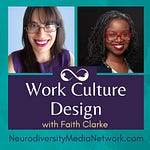In this episode, we dive deep into the world of work culture design, discussing the importance of creating a sustainable and ethical environment that supports both the organization and its employees. We explore the process of establishing a core culture, building capacity through responsive structures, and fostering collaboration. We also emphasize the significance of safety through reflection and the need for nuanced conversations around neurodiversity in the workplace. Join us for an engaging and thought-provoking discussion as we navigate the challenges of scaling a business, embracing chaos, and building a successful, inclusive work environment.
(0:00:03) - Designing a Sustainable Work Culture
(0:09:28) - Establishing and Building a Core Culture
(0:18:56) - Capacity Building Through Responsive Structures
(0:34:01) - Collaboration
(0:46:20) - Safety Through Reflection
(0:55:52) - Supporting Nuanced Conversations
(0:00:03) - Designing a Sustainable Work Culture (9 Minutes) In this episode, we dive into the concept of work culture design, specifically focusing on the five culture design questions necessary for assessing cultural health within an organization. We emphasize the importance of creating a space that naturally produces productivity while honoring the human aspect of work. By addressing these questions in small clusters of people, we can start to build a sustainable and ethical work culture that supports both the organization and its employees. The conversation also touches on the challenges of scaling a business and the need to create healthy ecosystems within pockets of relationships and connections.
(0:09:28) - Establishing and Building a Core Culture (9 Minutes) In this part of the conversation, we delve into the importance of understanding who we are collectively within a work environment and the barriers that prevent us from thriving. By identifying our collective identity and recognizing the power of our environment in shaping how we show up at work, we can begin to bridge the gap between who we are and who we want to be. We also discuss the significance of creating a safe space for everyone to participate in culture design and building the capacity to live in our desired core culture. This involves developing the ability to deeply listen, accept differences, and own our judgments of others.
(0:18:56) - Capacity Building Through Responsive Structures (15 Minutes) Throughout this conversation, we explore the importance of building micro behaviors in the workplace and how these behaviors contribute to a more inclusive and cohesive environment. We discuss the need for responsive structures that adapt to both internal and external changes, as well as emphasize the significance of cultivating a deep connection between team members. We also touch on the importance of integrating new employees into the organization and ensuring their voices are heard, as well as the challenges of navigating uncertain situations and embracing chaos. Ultimately, we highlight the value of focusing on human capacities and responsiveness to create a more sustainable and adaptable work culture.
(0:34:01) - Collaboration (12 Minutes) In this discussion, we examine the complexities of navigating chaos in the workplace, the importance of cultivating a safe environment, and the value of collaboration. By recognizing each individual's needs, we can create a culture where everyone thrives and can handle chaos. We delve into the significance of reflection and the distinction between discomfort and danger while emphasizing the need for constant communication and evaluation of processes. Ultimately, fostering a culture of understanding, forgiveness, and growth is key to building a successful and inclusive work environment.
(0:46:20) - Safety Through Reflection (9 Minutes) In this segment, we discuss the significance of reflection and review in the workplace and its connection to a culture of safety. We also consider the importance of debriefing, not just for major events but for the smaller, everyday interactions as well. Additionally, we touch upon the challenges of distinguishing discomfort from danger and the role of leaders in modeling this distinction. Finally, we reiterate the five key questions to consider for creating an inclusive and effective work culture, emphasizing the need for concrete answers and continuous practice.
(0:55:52) - Supporting Nuanced Conversations (1 Minutes) In this engaging conversation, we emphasize the importance of having in-depth and nuanced discussions about neurodiversity in the workplace. We highlight the need for open communication and active listening as we strive to create more inclusive environments. We also discuss the crucial role of supporters, such as those who subscribe to the neurodiversity media network, in furthering this work. Join us for a thought-provoking and insightful discussion as we explore the future of neurodiversity and its impact on the world.
Find the rest of this series here.






